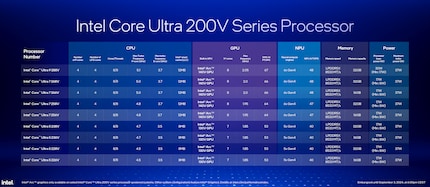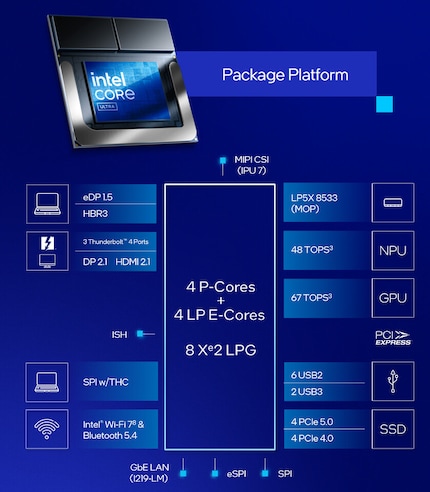
Intel promises over 20 hours of battery life with Lunar Lake
Intel is presenting the Core Ultra 200V processors at IFA. These promise a big leap in performance and, above all, long-lasting battery life.
The new mobile processors promise an enormous leap in computing power and efficiency. Lunar Lake is Intel's first product that is fully on the AI PC track. For the time being, they still lack Microsoft's "Copilot+ PC" label. This is set to change from November.

Source: Intel
The performance promises
Intel claims 18 per cent more performance compared to its predecessor, the Core Ultra 155H. The graphics performance is even said to be 30 per cent higher. At the same time, consumption has been reduced by 50 per cent. This corresponds to a doubling of performance per watt. With a Core Ultra 7 268V, Intel claims around 20.1 hours of battery life for office work. As always, the manufacturer's specifications should of course be treated with caution.
In comparison to AMD's Strix Point and Apple's M processors, the new Intel processors should be either faster, more economical or even both. This is partly due to the production process. Intel does not manufacture the chips itself, but has them produced by TSMC using the N3 process.
Memory soldered onto the CPU
The RAM is soldered onto the CPU package. This has the disadvantage that it can no longer be expanded later. On the other hand, the short signal paths allow high clock frequencies and simpler control. This also increases energy efficiency. Configurations with 16 or 32 gigabytes of LPDDR5X-8533 memory are available.
The design in particular leads to more economical processors
All Lunar Lake processors come with four performance cores ("Lion Cove") and four efficiency cores ("Skymont"). They differ in terms of the different clock frequencies and other features such as GPU or NPU performance. The flagship, the Core Ultra 9 288V, clocks at up to 5.1 GHz and has an ARC 140V graphics unit with 8 Xe2 cores. Intel puts the maximum TDP at 37 watts and the minimum at 8 watts.

Source: Intel
With Core Ultra 200, all applications now start on the efficiency cores and only switch to the performance cores when required. This was previously the other way round. This allows the latter to sleep longer, which has an impact on efficiency. Hyperthreading has also been removed from the performance cores for the first time, which should lead to additional savings.
The base clock is also reduced from 100 MHz to 16.67 MHz. This should lead to savings in all load states, as the CPU can clock more finely.
From big data to big brother, Cyborgs to Sci-Fi. All aspects of technology and society fascinate me.
From the latest iPhone to the return of 80s fashion. The editorial team will help you make sense of it all.
Show all